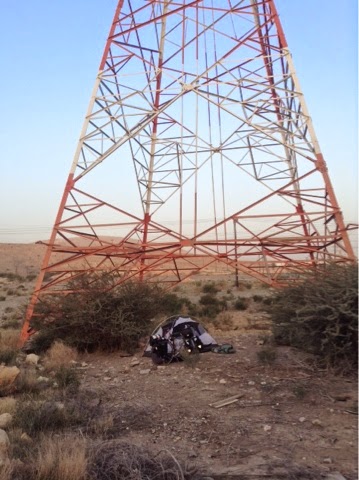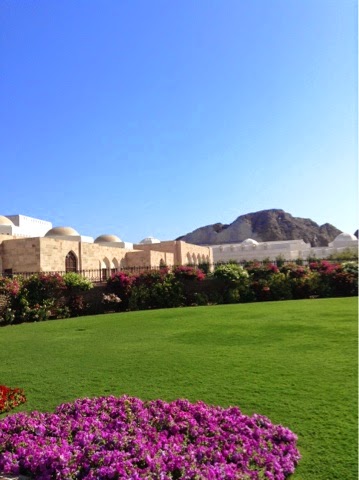"

Twenty-one course markers indicated the way for the peloton over the final two miles of the first stage of the Tour of Oman thanks in part to three sharp turns before the finishing straightaway. I was hoping to appropriate at least a couple of them after the conclusion of the stage. Miraculously, I was the only one with an interest in these little treasures. I could have had all of them. I grabbed a quick three before the awards ceremony and then a few more afterwards. It was hard to pass up the rest, but I can only strap so many to the back of my bike, and whatever I gathered, I'd have to transport a thousand miles over the next twenty days before I return home. Though I have lots of friends I'd like to share them with, as I've done with those from The Tour de France, I'll only be able to please a few.
Just as with the water bottles at the Dubai Tour a week ago, this was an unprecedented windfall. In Europe course markers are immediately pounced on as a prized souvenir by fans. And if they aren't quick about it, a clean-up crew will soon remove them. I'm lucky to return from my three weeks of following The Tour with five or six. I didn't expect much fan competition here in Oman, but I didn't know how much priority the race organizers would give to removing all evidence from the roadway that a race had just come through. At The Tour de France the authorities are highly efficient and eager to clean up one stage and be on to the next, what with twenty-one of them. And since The Tour de France sponsors this race, I feared they'd bring such efficiency with them. But not in that respect.
A half dozen French-chattering officials with a strong Gallic suavity were overseeing a crew of Omanis and Indians preparing the finishing stretch when I arrived at noon, three-and-half hours before the peloton was due. I was disappointed to learn that there would be no screen, large or small, televising the race for fans as is customary at The Tour and any high level race, even at Dubai. Nor was there to be a VIP tent where there is ordinarily a screen that the riff-raff might be able to glimpse. This was quite a small operation. Crews were just starting to set up the finish line barriers. Ordinarily they go on for several kilometers. Here it was just 250 meters.

There wasn't a single other spectator when I arrived. I meandered around a bit exploring the adjoining police academy and the two large stadiums with lights, then plopped down in the shade of a palm tree and read for a couple of hours until another fan showed up, a Scottish woman by the name of Linda, whose husband was a pilot for Omani Air. He had lost his job with a small British Air line less than a year ago. He was offered jobs in Kasathan and Oman. At the time the temperature in Kasathan was minus thirty Centigrade, while in Oman it was plus thirty. That made the decision easy for them. So far they have been very happy with the choice. They very much like the Omanis, but she said they aren't very hard working or ambitious, as the country is so wealthy everyone is guaranteed a government job.
Her husband is home every night, as he just does short flights to Iran and the United Arab Emirates. They are cycling fans and have attended The Tour de France three times. They went to the team hotel the day before and were amazed at the access they had to the riders. The riders were just hanging out and were most relaxed and approachable. It was a stark contrast to the frenzy of The Tour and the hoards it attracts. She was shocked how skinny the racers were, even Tom Boonen, who she had the impression was a hefty, solid guy.
She'd read many of the books on cycling that I had, including the biographies of the two most prominent Scottish riders, Robert and David Millar, both retired. She'd also recently read the autobiography of the French rider Bassons that I hadn't realized been translated into English. He quit racing early in the Lance era largely because he was a strong advocate for clean racing and Lance hounded him out for his accusations that just about everyone was doping except him. She said I could have the book and would give it to me when we next met. She doesn't much like driving in the hectic traffic here, so wasn't planning on going all the way to the stage two finish, as I was, rather seeing the intermediate sprint, as it was near where she lived, so we couldn't make the transaction then, but hopefully on one of the later stages.
After half an hour or so Stephen, the Polish cyclist, arrived with a couple of Polish friends and his daughter. He was crestfallen that the hotel the teams were staying at was so distant this year. He and each of his friends had Polish flags they were hoping to get autographed by the three Polish riders in the race. As we chatted, I scanned the handful of arriving fans hoping to spot a cyclist I had met the day before, a fifty-year old South African who had been touring the world for the past eight years. She wasn't in Oman for the race, but rather to visit a friend before she continued on to Sri Lanka, but there was a chance she'd show up for this cycling event. We'd had a sensational two-hour conversation we both wanted to continue.
We happened upon each other as I was pushing my bike down the sidewalk in Mutrah looking for a place with WIFI. I noticed a tall Western woman with a shawl covering her head coming towards me. When our eyes met, she smiled and veered over to me. She wasn't with her bike but I noticed what appeared to be a handlebar bag strapped over her shoulder. As we neared one another, I asked, "Is that a handlebar bag? Are you a cyclist too?"
Indeed she was, the most well-traveled cyclist I have ever met and most of her miles on her own, making her all the more extraordinary. Her name was Leana and her website is http://leananiemand.org.za She'd only taken up touring less than a decade ago. She was won over after joining up with a group of thirty others riding from Cairo to Cape Town with support--an annual event that she thought she would do for the hell of it despite having no touring experience. She loved it so much she quit her job and has been traveling the world since, starting with riding back up to Cairo, except this time on her own.
I've read a few accounts of those who have done it, but had never met anyone who had. They all dramatize the desert terrain of the Sudan, having to push one's bike for miles through the sand and getting lost not knowing which tracks to follow. She said she had to do some pushing, but not for long, and since the way followed the Nile, even when the tracks through the sand diverged, if one kept their bearings according to the river, one didn't have to worry about getting lost. She was aglow like Andre in "My Dinner With Andre" with only positive energy. I couldn't get a complaint out of her. When she said she biked South America from bottom to top, opposite to what I had done, I asked how she had coped with the notorious head winds of Patagonia that have defeated many a cyclist. "That's something I don't like to remember," is all she would say.
She knew she had had many extraordinary experiences thanks to the bike, but she was most humble and matter-of-fact about all her accomplishments, saying anyone could do them. There was no boasting or any attempt to impress, just a joyous sharing. She admitted there were moments when she asked herself, "What am I doing this for?" but she knew they would pass and she'd have no doubt why she was persisting at something that wasn't always so easy. She wild camped and had never been robbed or ever felt threatened. She thought it was an advantage, not a disadvantage, to be a woman. Her favorite country is India, where she is headed after Ski Lanka, and then on to Myanmar, which has just recently been opened up to cyclists, and then to China, another of her favorite countries. She was thrilled to have acquired a visa good for a year, giving her time for Mongolia as well.
This was like meeting Bettina Selby, the English cyclist who wrote nine books about her solitary cycling tours, mostly in Africa and Asia, and didn't start touring until she was forty and her children were grown. Leana didn't know of her. Bettina mentions being driven to tears at times, which has gotten her out of some tough scrapes. Leana has yet to have such an experience. She doesn't read much travel literature. She prefers to do it herself and make discoveries on her own. Nor did she know of the two other prominent women cyclists who've written quite a few books--Dervla Murphy of Ireland and Josie Dew of England--whose experiences also mirror hers.
This was a conversation for the ages. At first we dwelled on places we both had been and how much we loved them--Brasil, the Philippines, Australia--then we tried to pick the brains of each other on places only one of us had been and the other wished to go. Leana was able to give me encouragement on cycling Taiwan and South Korea, while I was able to fill her in on Japan, Iceland, Morroco and Uganda. This was a conversation that had no end, but she had to meet her friend to get a ride back to her house. At least we had each other's blogs to peruse, which could keep the conversation going indefinitely. Plus there was the chance she'd show up at this race, but it wasn't to be.
Not many did show up, explaining why there was no need to give any extras such as a broadcast of the action for the few gathered. Even before the helicopter appeared overhead indicating the imminence of the peloton, Linda and I noticed the soigneurs heading over to the finish line with their bags of cold drinks for the racers. We had no problem finding a spot right at the finish line. I was able to catch the winner, the Italian sprinter Amdrea Guardini riding for Astana just as he surged past Boonen and began lifting his hands from the handlebars to celebrate his victory.
Five minutes and three course markers later I was at the modest podium with the finishing arch in the background as he was given flowers and the red leader's jersey.
Just a few feet away Eddie Merckx was providing commentary and wondering if he knew the white-bearded guy crouched down taking his picture.
Yes, we had passed at The Tour, but never in such a casual manner as this. It was hard to believe the Yellow, Green and Red Polka Dot Jersey winners from The Tour were all here along with quite a few of the other top riders in the world and hardly anyone was paying them any attention. This was the sixth year this race had been held in Oman and it wasn't winning many converts. But at least it provided some good solid early season racing for the peloton while Europe was still engulfed in winter.










































